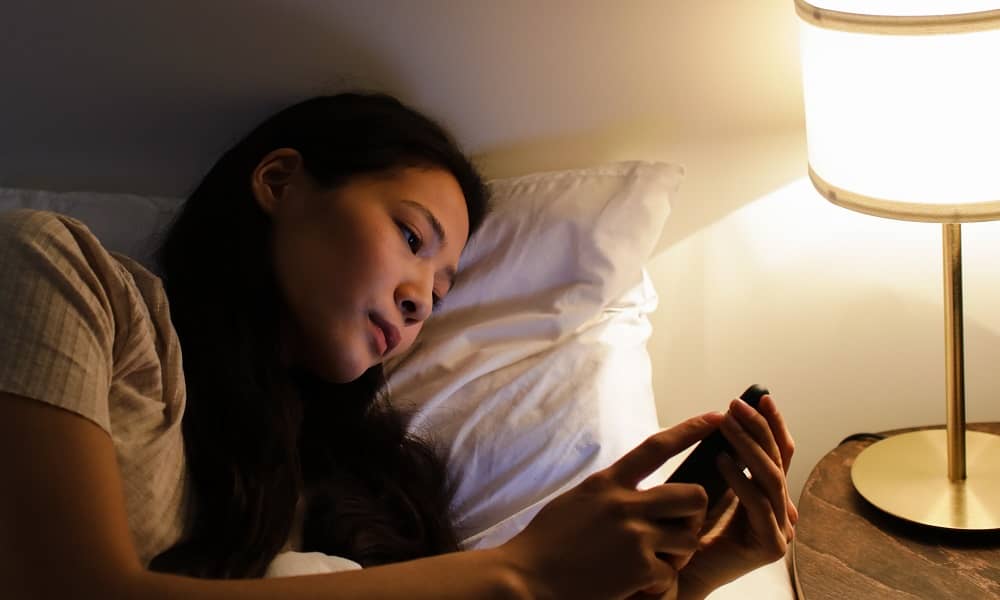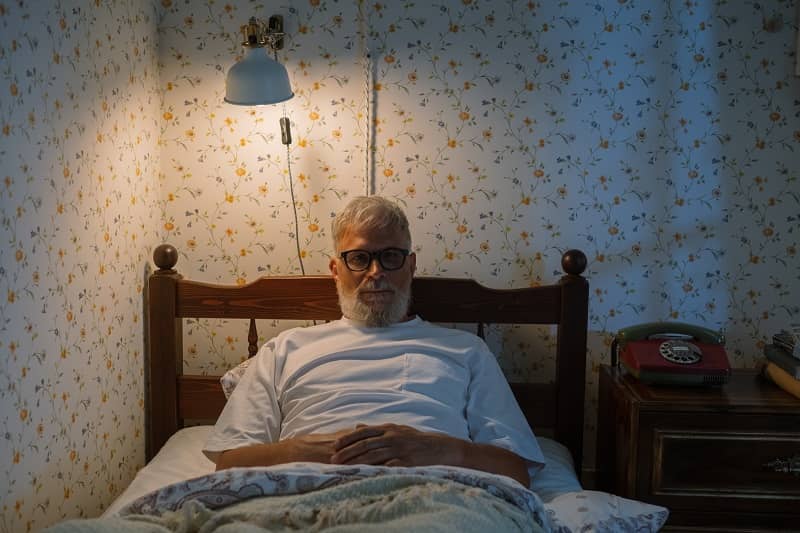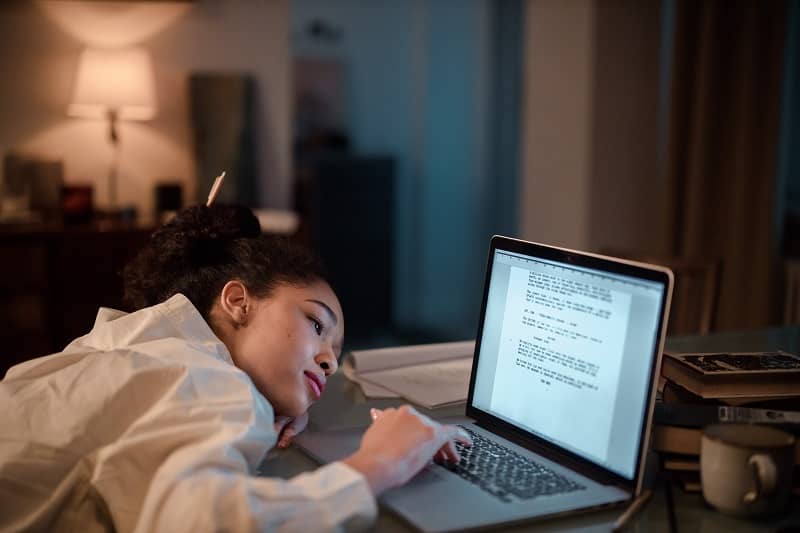
24 Jun How Does Blue Light Affect Your Sleep | 4 Ways to Prevent Effects
Today’s over-exposure to blue light has brought forth some concerns from experts. Can blue light affect your sleep cycle and can these effects be really bad in the long run?
The human body is programmed to work through the 24 hours cycle of light and darkness.
While light is functionally considered as a medium to help us see our surroundings or just a visual medium.
But what we don’t know much about are the different wavelengths of colors that make up light.
These different wavelengths of light can affect many of your physiological parameters including sleep.
Our body is accustomed to a circadian rhythm regulating the sleep cycle that is synchronized with the natural light and darkness.
But extending the hours of this natural light with the use of artificial lights has changed the general circadian rhythm, delaying sleep cycles.
In today’s blog, we’ll explore how light can affect your sleep cycle. And, most importantly, we’ll look into how blue light can affect sleep and the body’s circadian rhythm.
How Does Light Affect Sleep and Circadian Rhythm?

Blue light is technically a color in the light spectrum that’s visible to human eyes. Even the Sun emits it. And chances are you’re surrounded by different devices that emit blue light just as you read this blog.
What’s more interesting is that different spectrums of light can have unique effects on your sleep.
The effect of light on the human body is mediated through rods, cones, and a pigment called melanopsin.
The melanopsin, along with rods and cones, detects light that’s expressed in the ganglion (group of neuron cell bodies), and signals are sent to the brain.
These ganglions send these signals to several areas of the brain.
On detecting light, the photic signals adjust the circadian clock to the sleep-wake cycle, where light keeps you active.
Now, this was about how light affects sleep, but the picture of how different wavelengths of this light individually affect your sleep is wider.
Visible light, either natural or artificial, is a wide spectrum of different wavelengths, mainly:
- Violet – 405 nm of wavelength
- Blue – 470 nm of wavelength
- Green – 530 nm of wavelength
These different wavelengths of light affect sleep in different ways.
Different Wavelengths of Light and Sleep
In the recent issue of PLOS Biology, an investigation was made on mice to study the effects of light at different wavelengths on sleep.
For the study, photic pulses of three different wavelengths, violet, green, and blue were used.
According to the observation, the effects of light depend on wavelength and its effect on the pigment.
Results showed:
- Blue light increases alertness
- Green light induces sleep
This was because the pathways followed by these wavelengths were different.
But since blue light was seen to have a greater impact on the circadian rhythm according to this investigation, it helps us understand the light’s effect on sleep better.
Hence, here we look into how blue light affects your sleep.
What is Blue Light and How Does It Affect Sleep?
Light is a visible spectrum composed of energy called electromagnetic radiation.
These electromagnetic radiations are in the form of different bands of color that together make up light.
The band that has the highest electromagnetic radiation is visible to us as blue light.
Blue light has the shortest wavelength and hence the highest amount of energy in the light spectrum.
Now, according to the above study, this wavelength could affect your sleep cycle.
But there can be two types of blue light effects on sleep. One comes from natural sources and the other comes from artificial sources.
Blue Light and Your Health

The blue wavelength is present in the daylight too. Usually, the daylight doesn’t cause much disturbance in the body’s natural sleep-wake cycle.
Interestingly, exposure to this natural wavelength also offers many health benefits like:
- It enhances your cognitive functions and improves alertness by increasing the heart rate and elevating body temperature. The light keeps you in a pleasant mood and is hence good for your mental health too.
- The light affects the circadian rhythm as, during exposure to natural daylight, the blue light works in synchronizing the rhythm to ensure a good night’s sleep.
- Deficiency in exposure to the blue wavelength present in the natural sunlight can cause the development of myopia and near-sightedness.
However, the problem is the exposure to artificial blue light late into the night. Most of us are even habituated to use our phones well past the bedtime.
And when the exposure to the wavelength continues post-sunset too, the effects and results can be different.
Here’s how artificial blue light affects sleep.
How Does Blue Light Affect Sleep Quality and Patterns?
Post-sunset, the sources of blue light change from natural to artificial. There are actually numerous sources nowadays including:
- Mobile screens
- e-readers
- LED bulbs, and
- laptops or computers
According to studies, exposure to such devices can affect sleep quality by reducing the amounts of melatonin produced by the body.
Melatonin is a hormone that stimulates the transition between wakefulness to sleep by making you drowsy.
Darkness induces faster secretion of melatonin while exposure to artificial blue light slows down the production.
Since blue light was found to be associated with decreased production of melatonin, it can delay your transition to nap time.
Here’s the complete study to give you a better view of what basis was used to conclude the results.
Studies on How Does Blue Light Affects Sleep at Night
Following studies have proven the effects of blue light on your sleep cycle.
Study I – The Blue Light and Sleep
This study compared the effects of reading an electronic book on a device that emitted blue light with the effects of reading a normal book before sleep.
Observations were made by using the model where the people invested in reading the books and e-books hours before bedtime.
According to the results, people who were using the e-device:
- Took longer to fall asleep
- Had lower alertness the following morning
The reasons for the same were thought to be:
- Reduced levels of melatonin
- Delayed timing of the circadian clock as the next day alertness was decreased.
Study II – Blue Light Suppresses Melatonin for a Long Time
The study by Harvard researchers compared the effects of exposure to blue light for 6.5 hours to that of green light.
According to the results, the blue light suppressed melatonin for twice longer as the green light.
Moreover, this also shifted their circadian rhythm for similar hours (3 hours by blue light).
Hence, the studies indicate that too much exposure to blue light, from screens or through sleeping with blue led lights, can delay your sleep cycle by melatonin suppression.
But will this delay cost you your whole night of sleep?
Let’s find out how many hours of sleep you are gonna cost yourself by exposing yourself to excessive blue light.
How Long Does Blue Light Affect Sleep?
The answer to this question comes from another study on how blue light affects sleep.
This study was conducted with 19 participants from the age group of 20 to 29 years.
First, an actigraph was used for one week on the participants to observe the time they generally take to fall asleep.
Secondly, the participants (post one week) were exposed to blue light from 9:00 pm to 11:00 pm daily.
After the exposure, they were connected to instruments to measure their brain waves and the sleep stages that they went through throughout the night.
On average, just two hours of exposure to blue light reduces the sleep duration by 16 minutes.
This was because the blue light had reduced the melatonin secretion through these two hours of exposure.
Hence, the study indicates that the longer you are exposed to the blue light, the more melatonin is suppressed and you lose crucial minutes of your sleep.
However, you can still prevent these effects of blue light by taking some precautions.
How to Prevent the Blue Light Effects on Eyes and Sleep? [4 Ways]
Since we already know how blue light affects sleep, we can prevent ourselves from getting exposed to too much of this wavelength.
Some of the best ways to reduce the blue light effects are:
- Reduce screen time – Although computers and mobile phones have become an integral part of your life, taking a break off the screen is not gonna cause much harm. Digital screens emit the highest amount of blue light wavelengths and hence we suggest taking 20 seconds break every 20 minutes.
- No blue light rule at night – By night, we mean taking a break from the screens at least three hours before you go to the bed. This helps stop the blue light from inhibiting the secretion of melatonin.
- The computer glasses – For all those people who have to work throughout the day on desktops, it’s always better to go for the blue light-blocking computer glasses. Though there isn’t a clear explanation of how these glasses work, they reduce the amount of eye strain caused by blue light. As a result, they also help prevent dry eye and blurred vision.
- The screen filters – There are many screen filters for smartphones and other gadgets available on the market. These screen filters filter out the blue light being emitted by the screen. You can even switch to night mode to reduce the amount of blue light that affects your eyes.
Other Useful Tips – Turn off all the lights 1 to 2 hours before going to the bed. This will ensure sound sleep. You can even opt for red or orange shaded reading lamps to improve your quality of sleep. Seek professional help for sleeping disorders – On the off chance, if you feel that you find trouble sleeping at night, you might be affected by insomnia. Hence, consult a doctor for such a condition as even limiting blue light exposure doesn’t help in treating insomnia without medical help.
PEOPLE ALSO READ: Is It Bad to Sleep with Lights on?
Final Thought
Different types of light can have different effects on your biological parameters or your health.
But the most talked-about is how light can affect your quality of sleep.
The subject has gained loads of curiosity and there have been quite a several studies dealing with the same issues.
Almost all the results have been conclusive in stating that blue light is the most notorious for delaying the time you take to fall asleep.
Blue light is that component of the light spectrum that has the shortest wavelength and is known to cause decreased secretion of melatonin.
Since melatonin is crucial for the stage where you go from active to sleepy, blue light highly impacts your sleep cycle.
But if you ask us why is blue light bad, the natural blue light isn’t bad and has lots of health benefits.
The blue light exposure you need to (or can) eliminate seldom comes from the daytime light. It is the overuse of blue light devices you need to keep a check on.
Hopefully, you’ll follow our tips to prevent the excessive use of blue light. For any more questions, use the comments section below.



No Comments